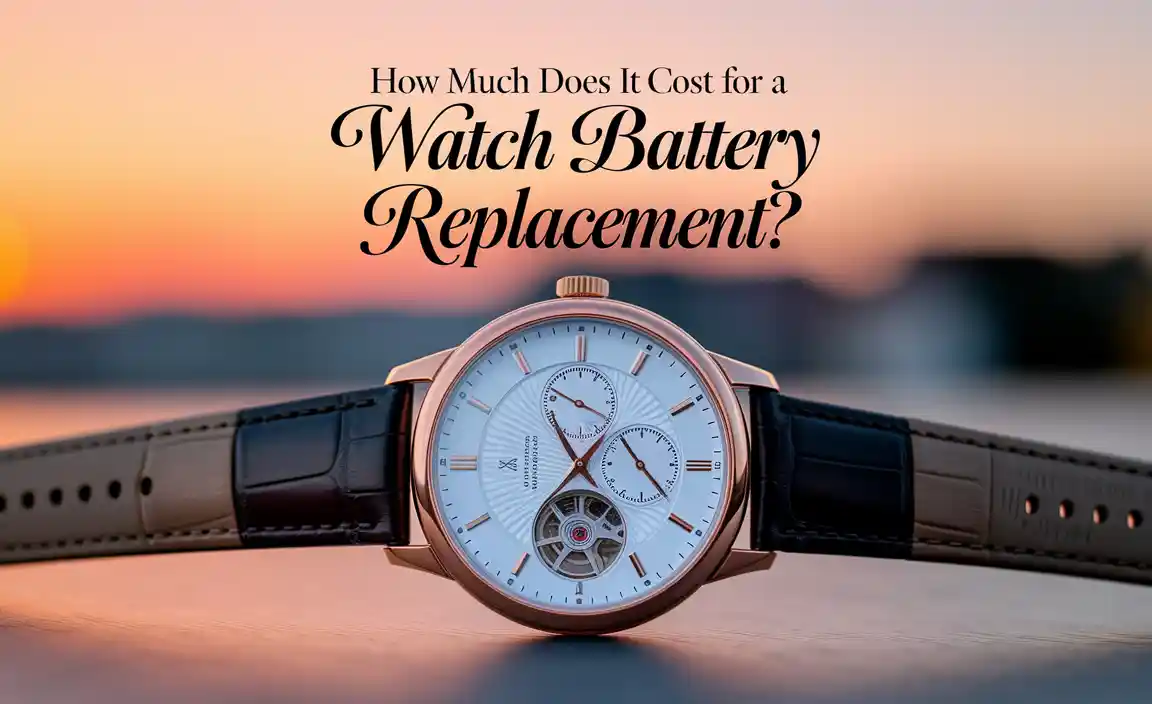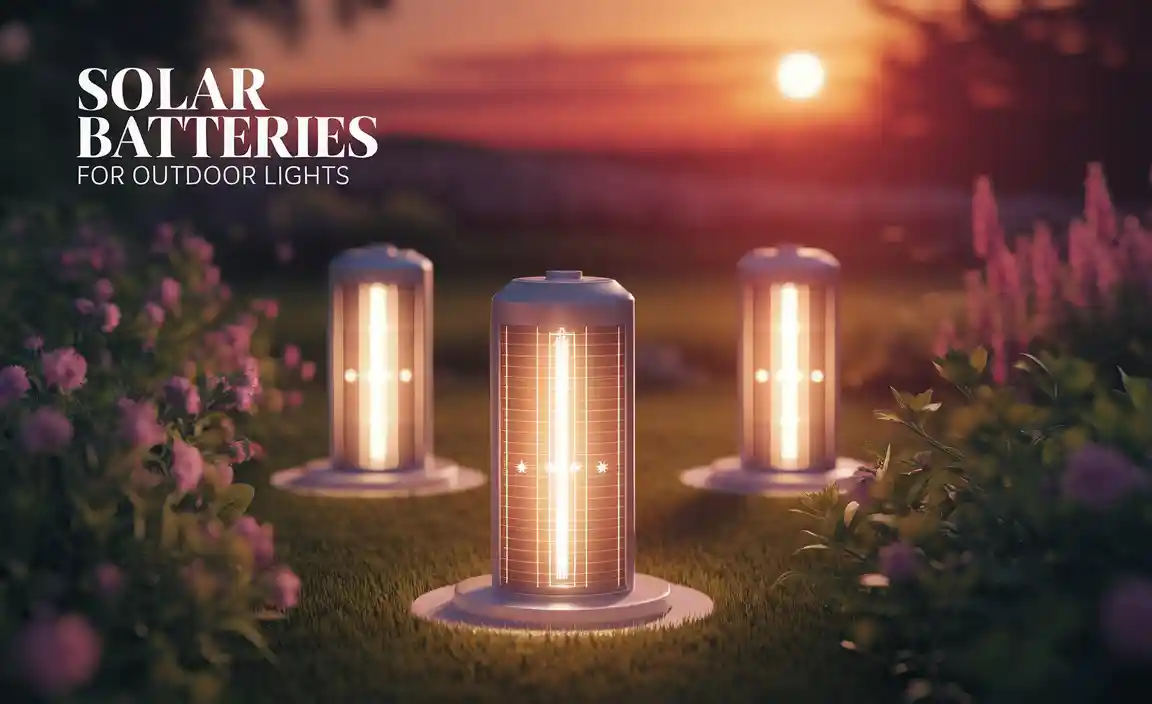Have you ever bought a new battery, only to wonder how long it will last? It’s a question many people ask. Batteries power our toys, remote controls, and even our favorite gadgets. But how long are batteries good for once you take them home?
Imagine this: you open a new toy on your birthday, only to find it won’t turn on later that week. Frustrating, right? Many people don’t realize that batteries can lose their power even when they sit on the shelf. This includes rechargeable ones too!
In this article, we will explore how long are batteries good for. We will share tips on making your batteries last longer and what to look out for when you buy new ones. Understanding batteries better can help you avoid those unexpected surprises. So, let’s dive in and discover the lifespan of batteries together!
How Long Are Batteries Good For? Shelf Life Explained

How Long Are Batteries Good For?
Batteries do not last forever. Most alkaline batteries can last up to 5-10 years if stored properly. Did you know that high temperatures can shorten a battery’s life? For rechargeable batteries, you might get around 2-3 years before they begin to degrade. Always check the expiration date to ensure efficiency. Understanding battery longevity helps you save money and avoid surprises when devices suddenly lose power!Understanding Battery Lifespan
Definition and factors affecting battery lifespan. Types of batteries and their typical longevity.Battery lifespan is all about how long they can keep your gadgets buzzing with energy. It really depends on the type of battery and how you use it. For example, alkaline batteries usually last 5-10 years, while rechargeable ones might only live 2-3 years if you’re giving them a workout. They can live longer with proper care! Here’s a fun little table to break it down:
| Battery Type | Typical Lifespan |
|---|---|
| Alkaline | 5-10 years |
| Lithium | 10-15 years |
| NiMH Rechargeable | 2-3 years |
| Lead Acid | 3-5 years |
So, take care of your batteries! Store them cool and dry, and they might just stick around longer, like that pizza slice you forgot about in the fridge.
Common Battery Types and Their Durability
Alkaline batteries: lifespan expectations. Lithiumion batteries: charging cycles and degradation.Different batteries have varying lifespans. Alkaline batteries typically last from 5 to 10 years when stored properly. They power household items like remotes and toys. On the other hand, lithium-ion batteries, found in phones and laptops, have a lifespan of about 2 to 3 years. They perform well but can degrade after hundreds of charge cycles.
How long do different battery types last?
Alkaline batteries usually last 5 to 10 years, while lithium-ion batteries last about 2 to 3 years before their ability to hold a charge decreases.
Factors Influencing Battery Life
Storage conditions: temperature and humidity effects. Usage patterns: how frequent use impacts longevity.Many factors can affect how long batteries last. Storage conditions are key. Batteries like to hang out in cool and dry places. Too much heat and humidity can make them grumpy and less effective. You don’t want your batteries to feel like they’re on a summer vacation at the beach!
Usage patterns also play a role. The more you use a battery, the faster it drains. Frequent use can shorten its life. So, if your remote control is getting a workout, you might want to keep some backup batteries handy. Remember, batteries need some TLC to last longer!
| Storage Condition | Effect on Battery Life |
|---|---|
| High Temperature | Shortens lifespan |
| Low Temperature | May reduce performance |
| High Humidity | Causes corrosion |
| Dry Environment | Good for longevity |
Signs of Battery Degradation
Indicators that batteries need replacement. Testing battery health and performance.Look for clues that show batteries are losing power. Common signs include:
- Your devices don’t last as long as they used to.
- They take longer to charge than before.
- You notice corrosion or leaks around the battery.
To check battery health, use a multimeter. A healthy battery usually shows good voltage. If values drop, that’s a sign for a change. Don’t forget to replace batteries before they die completely!
How often should you replace batteries?
Most batteries last **1-3 years** depending on usage. Monitor performance to know when to swap them out.
Best Practices for Extending Battery Life
Proper storage methods for different battery types. Tips for optimal usage to prolong lifespan.Proper care can make batteries last longer. For different battery types, storage matters. Rechargeable batteries should stay cool in a dry space. Keep them away from direct sunlight. For alkaline batteries, avoid heat sources. Use batteries until they are low before charging. Here are some tips to help you:
- Don’t mix old and new batteries.
- Remove batteries from devices not in use.
- Regularly check and clean battery terminals.
Following these steps can help your batteries last much longer!
How can I store batteries properly?
Store batteries in a cool, dry place. Make sure the positive and negative ends do not touch. This helps prevent leaks and makes them last longer. Also, keep batteries in their original packaging if possible.
Sustainability and Recycling of Batteries
Importance of recycling used batteries. How to properly dispose of nonreusable batteries.Recycling used batteries is super important! When batteries are tossed aside, they can pollute the earth and harm animals. Batteries contain materials that can be harmful if not disposed of properly. To recycle them, look for special recycling bins or take them to a local drop-off center. It’s like sending the batteries to a spa, where they can get a fresh start! Remember, never put non-reusable batteries in the regular trash. They deserve better!
| Battery Type | How to Dispose |
|---|---|
| Rechargeable | Recycle at special centers |
| Non-rechargeable | Take to hazardous waste sites |
Taking care of our planet is a team effort. So, be a superhero and recycle those batteries! After all, saving the Earth is way cooler than letting it get messy.
The Future of Battery Technology
Innovations in battery technology and expected lifespans. Trends in rechargeable batteries و sustainability aspects.Battery technology is changing fast! New types of batteries are appearing all the time, making them last longer and charge quicker. Imagine a battery that helps your phone live its best life—like a superhero! Rechargeable batteries are getting even better, offering more power and being kinder to our planet. Exciting advances show that future batteries might last for several years, cutting down on waste and making life easier. Here’s a short glimpse of what’s brewing:
| Battery Type | Lifespan | Sustainability |
|---|---|---|
| Lithium-ion | 5-10 years | Recyclable |
| Solid-state | 10+ years | Less harmful |
| Flow batteries | 5-15 years | Eco-friendly |
Who knew batteries could be so interesting? With these new trends, we can look forward to devices that not only work better but also help our world.
Conclusion
In conclusion, batteries typically last between 2 to 5 years. Factors like temperature and usage can change this. To keep your batteries working longer, store them in cool, dry places. Remember to check expiration dates too! If you want to learn more, explore battery types and care tips. Taking good care of your batteries helps you save money and energy!FAQs
Certainly! Here Are Five Questions Related To The Longevity Of Batteries:Batteries can last a long time if we take care of them. You should keep them away from heat and cold places. Using your devices wisely also helps. Don’t let your battery go all the way down too often. It’s like giving your battery a good rest!
Sure! Please provide the question you would like me to answer.
What Factors Influence The Lifespan Of Different Types Of Batteries (E.G., Alkaline, Lithium-Ion, Nickel-Cadmium)?Different batteries last for different amounts of time. One key factor is how much you use them. For example, lithium-ion batteries work well for a long time if you charge them right. Temperature also matters; hot or cold places can make them wear out faster. Finally, how you store batteries when you’re not using them can affect their lifespan, too.
How Can Users Maximize The Lifespan Of Rechargeable Batteries?To make your rechargeable batteries last longer, charge them only when they are low. Don’t let them sit in the charger all the time. Keep them cool and away from heat, like sunlight or hot places. Use your batteries regularly, and try not to let them go completely dead. Taking care of your batteries helps them last for a long time!
What Is The Typical Shelf Life Of Unused Batteries, And How Can You Tell If They Are Still Good?Unused batteries usually last between 3 to 10 years, depending on the type. To check if they are still good, you can look at the expiration date on the package. You can also test them in a device. If the device works, the battery is still good!
How Does Temperature And Humidity Affect Battery Performance And Longevity?Temperature and humidity can change how batteries work. When it’s hot, batteries can drain faster and might wear out quicker. If it’s cold, they might not work well at all. High humidity can cause batteries to rust or break down faster. Keeping batteries in cool, dry places helps them last longer and work better.
When Should Batteries Be Replaced In Devices To Ensure Optimal Performance And Safety?You should replace batteries when your device doesn’t turn on or works slowly. If you see a leak or rust, it’s time for a new battery. Always check the battery’s age; most last about one to three years. Changing them helps keep your devices safe and working well!
{“@context”:”https://schema.org”,”@type”: “FAQPage”,”mainEntity”:[{“@type”: “Question”,”name”: “Certainly! Here Are Five Questions Related To The Longevity Of Batteries:”,”acceptedAnswer”: {“@type”: “Answer”,”text”: “Batteries can last a long time if we take care of them. You should keep them away from heat and cold places. Using your devices wisely also helps. Don’t let your battery go all the way down too often. It’s like giving your battery a good rest!”}},{“@type”: “Question”,”name”: “”,”acceptedAnswer”: {“@type”: “Answer”,”text”: “Sure! Please provide the question you would like me to answer.”}},{“@type”: “Question”,”name”: “What Factors Influence The Lifespan Of Different Types Of Batteries (E.G., Alkaline, Lithium-Ion, Nickel-Cadmium)?”,”acceptedAnswer”: {“@type”: “Answer”,”text”: “Different batteries last for different amounts of time. One key factor is how much you use them. For example, lithium-ion batteries work well for a long time if you charge them right. Temperature also matters; hot or cold places can make them wear out faster. Finally, how you store batteries when you’re not using them can affect their lifespan, too.”}},{“@type”: “Question”,”name”: “How Can Users Maximize The Lifespan Of Rechargeable Batteries?”,”acceptedAnswer”: {“@type”: “Answer”,”text”: “To make your rechargeable batteries last longer, charge them only when they are low. Don’t let them sit in the charger all the time. Keep them cool and away from heat, like sunlight or hot places. Use your batteries regularly, and try not to let them go completely dead. Taking care of your batteries helps them last for a long time!”}},{“@type”: “Question”,”name”: “What Is The Typical Shelf Life Of Unused Batteries, And How Can You Tell If They Are Still Good?”,”acceptedAnswer”: {“@type”: “Answer”,”text”: “Unused batteries usually last between 3 to 10 years, depending on the type. To check if they are still good, you can look at the expiration date on the package. You can also test them in a device. If the device works, the battery is still good!”}},{“@type”: “Question”,”name”: “How Does Temperature And Humidity Affect Battery Performance And Longevity?”,”acceptedAnswer”: {“@type”: “Answer”,”text”: “Temperature and humidity can change how batteries work. When it’s hot, batteries can drain faster and might wear out quicker. If it’s cold, they might not work well at all. High humidity can cause batteries to rust or break down faster. Keeping batteries in cool, dry places helps them last longer and work better.”}},{“@type”: “Question”,”name”: “When Should Batteries Be Replaced In Devices To Ensure Optimal Performance And Safety?”,”acceptedAnswer”: {“@type”: “Answer”,”text”: “You should replace batteries when your device doesn’t turn on or works slowly. If you see a leak or rust, it’s time for a new battery. Always check the battery’s age; most last about one to three years. Changing them helps keep your devices safe and working well!”}}]}






